Marketing Across Cultures: Analysis of CCA Techniques for Wego
VerifiedAdded on 2023/01/19
|18
|6085
|51
Report
AI Summary
This report delves into the complexities of marketing across cultures, focusing on Cross-Cultural Analysis (CCA) techniques. It begins with an introduction to the concept of global marketing and the importance of understanding cultural nuances. The report examines three key traditional CCA techniques: Hofstede's cultural dimensions, Hall and Hall's context and time dimensions, and Trompenaars' cultural dimensions model. Each technique is explained in detail, highlighting its dimensions and application in a global context. The report then compares and contrasts these CCA techniques, providing a comprehensive understanding of their strengths and weaknesses. Finally, the report provides recommendations based on the analysis of the techniques, with a focus on how the fashion retail brand Wego can leverage these techniques for successful international marketing. The report concludes with a summary of the key findings and their implications for effective cross-cultural marketing strategies. The report emphasizes the importance of adapting marketing strategies to suit the cultural context of the target market. It also highlights the significance of understanding cultural differences in communication, time perception, and values to build strong customer relationships and achieve marketing success.
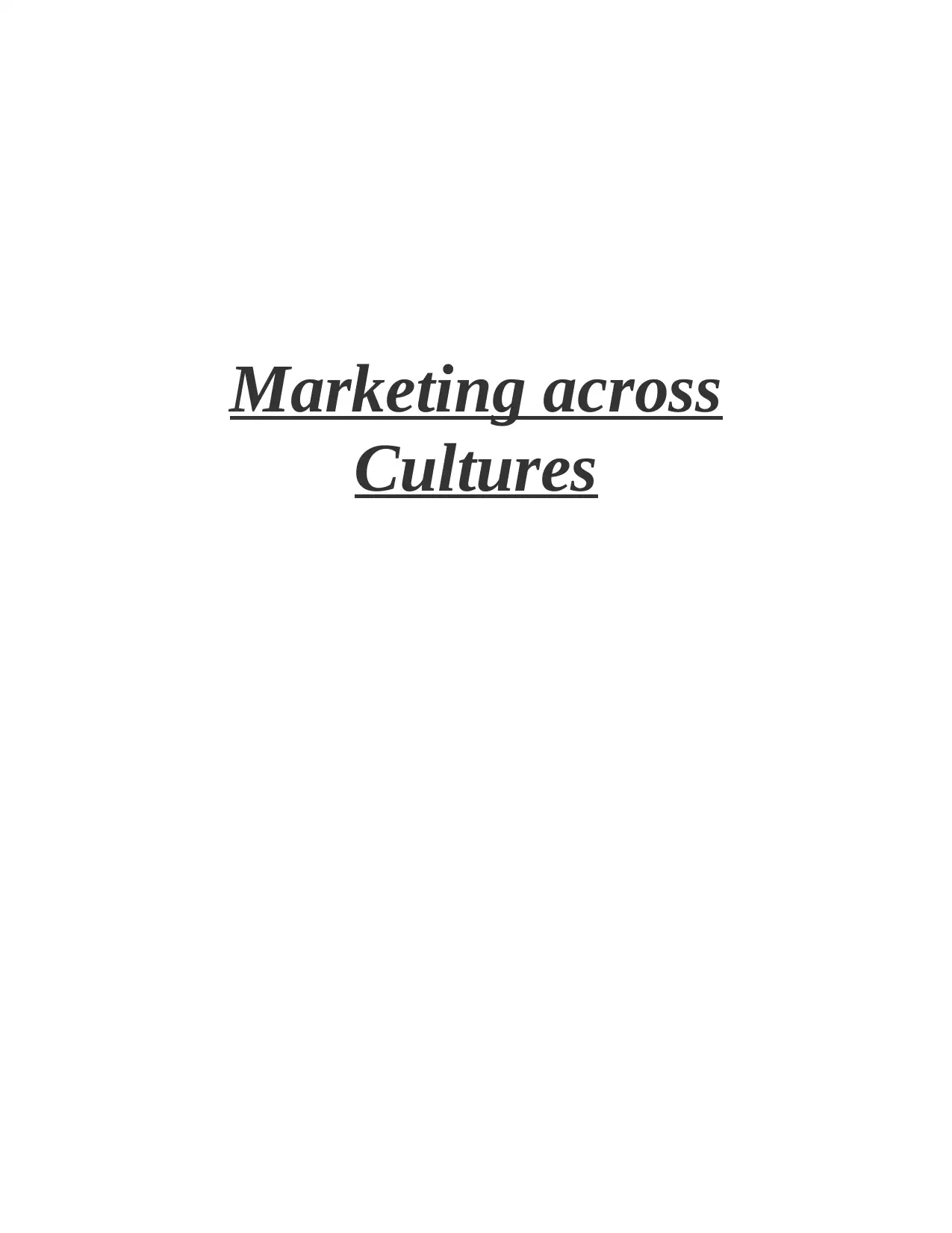
Marketing across
Cultures
Cultures
Paraphrase This Document
Need a fresh take? Get an instant paraphrase of this document with our AI Paraphraser
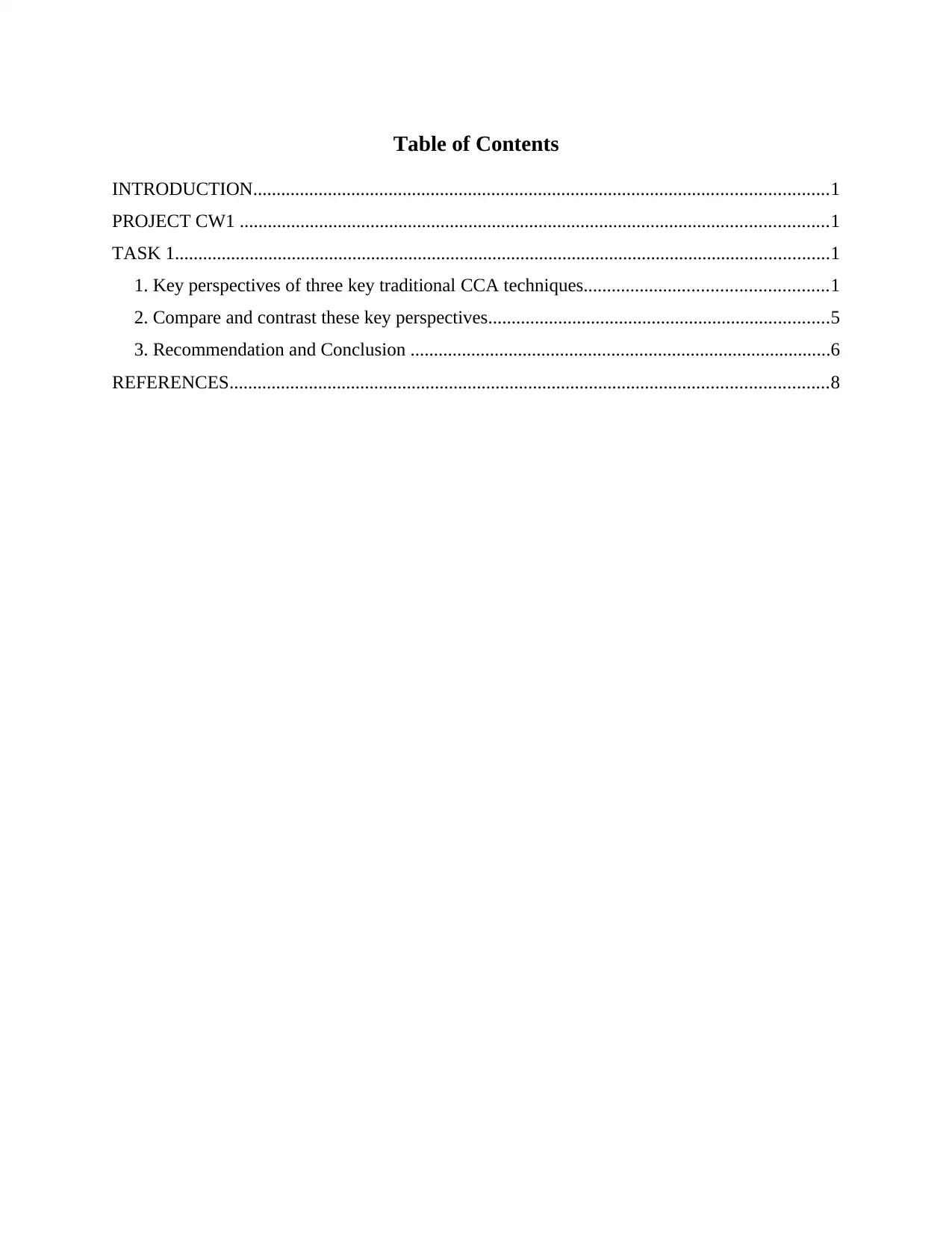
Table of Contents
INTRODUCTION...........................................................................................................................1
PROJECT CW1 ..............................................................................................................................1
TASK 1............................................................................................................................................1
1. Key perspectives of three key traditional CCA techniques....................................................1
2. Compare and contrast these key perspectives.........................................................................5
3. Recommendation and Conclusion ..........................................................................................6
REFERENCES................................................................................................................................8
INTRODUCTION...........................................................................................................................1
PROJECT CW1 ..............................................................................................................................1
TASK 1............................................................................................................................................1
1. Key perspectives of three key traditional CCA techniques....................................................1
2. Compare and contrast these key perspectives.........................................................................5
3. Recommendation and Conclusion ..........................................................................................6
REFERENCES................................................................................................................................8
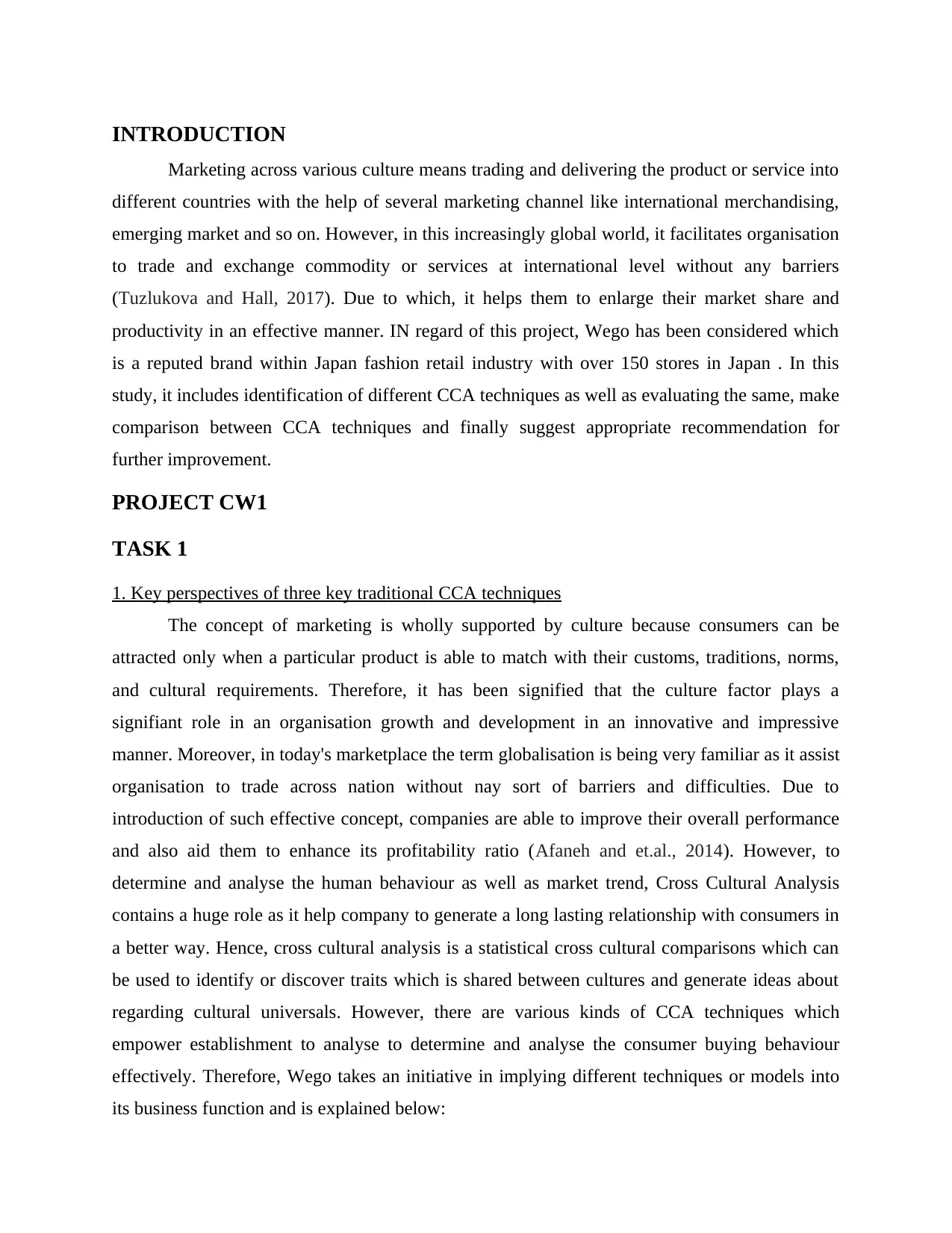
INTRODUCTION
Marketing across various culture means trading and delivering the product or service into
different countries with the help of several marketing channel like international merchandising,
emerging market and so on. However, in this increasingly global world, it facilitates organisation
to trade and exchange commodity or services at international level without any barriers
(Tuzlukova and Hall, 2017). Due to which, it helps them to enlarge their market share and
productivity in an effective manner. IN regard of this project, Wego has been considered which
is a reputed brand within Japan fashion retail industry with over 150 stores in Japan . In this
study, it includes identification of different CCA techniques as well as evaluating the same, make
comparison between CCA techniques and finally suggest appropriate recommendation for
further improvement.
PROJECT CW1
TASK 1
1. Key perspectives of three key traditional CCA techniques
The concept of marketing is wholly supported by culture because consumers can be
attracted only when a particular product is able to match with their customs, traditions, norms,
and cultural requirements. Therefore, it has been signified that the culture factor plays a
signifiant role in an organisation growth and development in an innovative and impressive
manner. Moreover, in today's marketplace the term globalisation is being very familiar as it assist
organisation to trade across nation without nay sort of barriers and difficulties. Due to
introduction of such effective concept, companies are able to improve their overall performance
and also aid them to enhance its profitability ratio (Afaneh and et.al., 2014). However, to
determine and analyse the human behaviour as well as market trend, Cross Cultural Analysis
contains a huge role as it help company to generate a long lasting relationship with consumers in
a better way. Hence, cross cultural analysis is a statistical cross cultural comparisons which can
be used to identify or discover traits which is shared between cultures and generate ideas about
regarding cultural universals. However, there are various kinds of CCA techniques which
empower establishment to analyse to determine and analyse the consumer buying behaviour
effectively. Therefore, Wego takes an initiative in implying different techniques or models into
its business function and is explained below:
Marketing across various culture means trading and delivering the product or service into
different countries with the help of several marketing channel like international merchandising,
emerging market and so on. However, in this increasingly global world, it facilitates organisation
to trade and exchange commodity or services at international level without any barriers
(Tuzlukova and Hall, 2017). Due to which, it helps them to enlarge their market share and
productivity in an effective manner. IN regard of this project, Wego has been considered which
is a reputed brand within Japan fashion retail industry with over 150 stores in Japan . In this
study, it includes identification of different CCA techniques as well as evaluating the same, make
comparison between CCA techniques and finally suggest appropriate recommendation for
further improvement.
PROJECT CW1
TASK 1
1. Key perspectives of three key traditional CCA techniques
The concept of marketing is wholly supported by culture because consumers can be
attracted only when a particular product is able to match with their customs, traditions, norms,
and cultural requirements. Therefore, it has been signified that the culture factor plays a
signifiant role in an organisation growth and development in an innovative and impressive
manner. Moreover, in today's marketplace the term globalisation is being very familiar as it assist
organisation to trade across nation without nay sort of barriers and difficulties. Due to
introduction of such effective concept, companies are able to improve their overall performance
and also aid them to enhance its profitability ratio (Afaneh and et.al., 2014). However, to
determine and analyse the human behaviour as well as market trend, Cross Cultural Analysis
contains a huge role as it help company to generate a long lasting relationship with consumers in
a better way. Hence, cross cultural analysis is a statistical cross cultural comparisons which can
be used to identify or discover traits which is shared between cultures and generate ideas about
regarding cultural universals. However, there are various kinds of CCA techniques which
empower establishment to analyse to determine and analyse the consumer buying behaviour
effectively. Therefore, Wego takes an initiative in implying different techniques or models into
its business function and is explained below:
⊘ This is a preview!⊘
Do you want full access?
Subscribe today to unlock all pages.

Trusted by 1+ million students worldwide
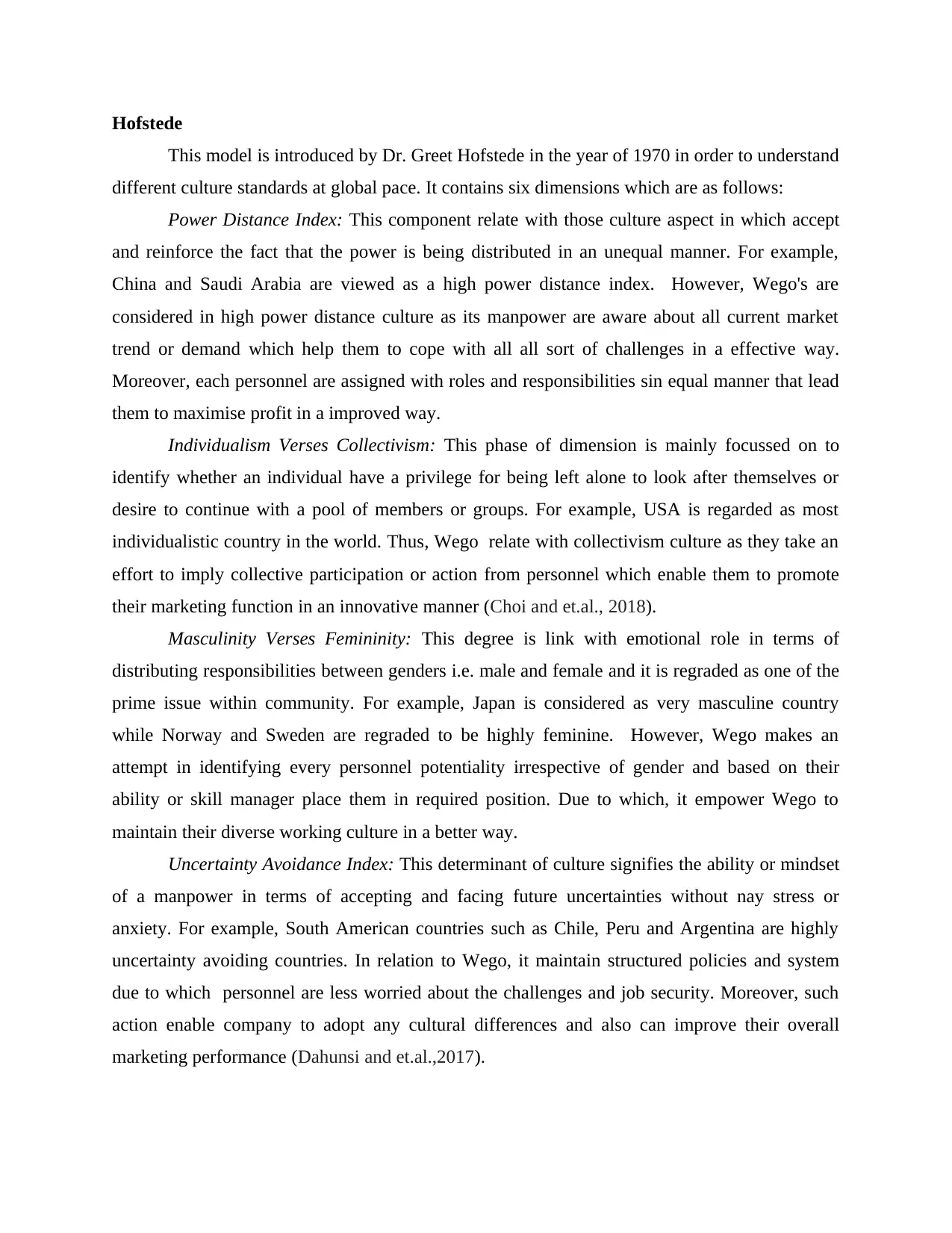
Hofstede
This model is introduced by Dr. Greet Hofstede in the year of 1970 in order to understand
different culture standards at global pace. It contains six dimensions which are as follows:
Power Distance Index: This component relate with those culture aspect in which accept
and reinforce the fact that the power is being distributed in an unequal manner. For example,
China and Saudi Arabia are viewed as a high power distance index. However, Wego's are
considered in high power distance culture as its manpower are aware about all current market
trend or demand which help them to cope with all all sort of challenges in a effective way.
Moreover, each personnel are assigned with roles and responsibilities sin equal manner that lead
them to maximise profit in a improved way.
Individualism Verses Collectivism: This phase of dimension is mainly focussed on to
identify whether an individual have a privilege for being left alone to look after themselves or
desire to continue with a pool of members or groups. For example, USA is regarded as most
individualistic country in the world. Thus, Wego relate with collectivism culture as they take an
effort to imply collective participation or action from personnel which enable them to promote
their marketing function in an innovative manner (Choi and et.al., 2018).
Masculinity Verses Femininity: This degree is link with emotional role in terms of
distributing responsibilities between genders i.e. male and female and it is regraded as one of the
prime issue within community. For example, Japan is considered as very masculine country
while Norway and Sweden are regraded to be highly feminine. However, Wego makes an
attempt in identifying every personnel potentiality irrespective of gender and based on their
ability or skill manager place them in required position. Due to which, it empower Wego to
maintain their diverse working culture in a better way.
Uncertainty Avoidance Index: This determinant of culture signifies the ability or mindset
of a manpower in terms of accepting and facing future uncertainties without nay stress or
anxiety. For example, South American countries such as Chile, Peru and Argentina are highly
uncertainty avoiding countries. In relation to Wego, it maintain structured policies and system
due to which personnel are less worried about the challenges and job security. Moreover, such
action enable company to adopt any cultural differences and also can improve their overall
marketing performance (Dahunsi and et.al.,2017).
This model is introduced by Dr. Greet Hofstede in the year of 1970 in order to understand
different culture standards at global pace. It contains six dimensions which are as follows:
Power Distance Index: This component relate with those culture aspect in which accept
and reinforce the fact that the power is being distributed in an unequal manner. For example,
China and Saudi Arabia are viewed as a high power distance index. However, Wego's are
considered in high power distance culture as its manpower are aware about all current market
trend or demand which help them to cope with all all sort of challenges in a effective way.
Moreover, each personnel are assigned with roles and responsibilities sin equal manner that lead
them to maximise profit in a improved way.
Individualism Verses Collectivism: This phase of dimension is mainly focussed on to
identify whether an individual have a privilege for being left alone to look after themselves or
desire to continue with a pool of members or groups. For example, USA is regarded as most
individualistic country in the world. Thus, Wego relate with collectivism culture as they take an
effort to imply collective participation or action from personnel which enable them to promote
their marketing function in an innovative manner (Choi and et.al., 2018).
Masculinity Verses Femininity: This degree is link with emotional role in terms of
distributing responsibilities between genders i.e. male and female and it is regraded as one of the
prime issue within community. For example, Japan is considered as very masculine country
while Norway and Sweden are regraded to be highly feminine. However, Wego makes an
attempt in identifying every personnel potentiality irrespective of gender and based on their
ability or skill manager place them in required position. Due to which, it empower Wego to
maintain their diverse working culture in a better way.
Uncertainty Avoidance Index: This determinant of culture signifies the ability or mindset
of a manpower in terms of accepting and facing future uncertainties without nay stress or
anxiety. For example, South American countries such as Chile, Peru and Argentina are highly
uncertainty avoiding countries. In relation to Wego, it maintain structured policies and system
due to which personnel are less worried about the challenges and job security. Moreover, such
action enable company to adopt any cultural differences and also can improve their overall
marketing performance (Dahunsi and et.al.,2017).
Paraphrase This Document
Need a fresh take? Get an instant paraphrase of this document with our AI Paraphraser
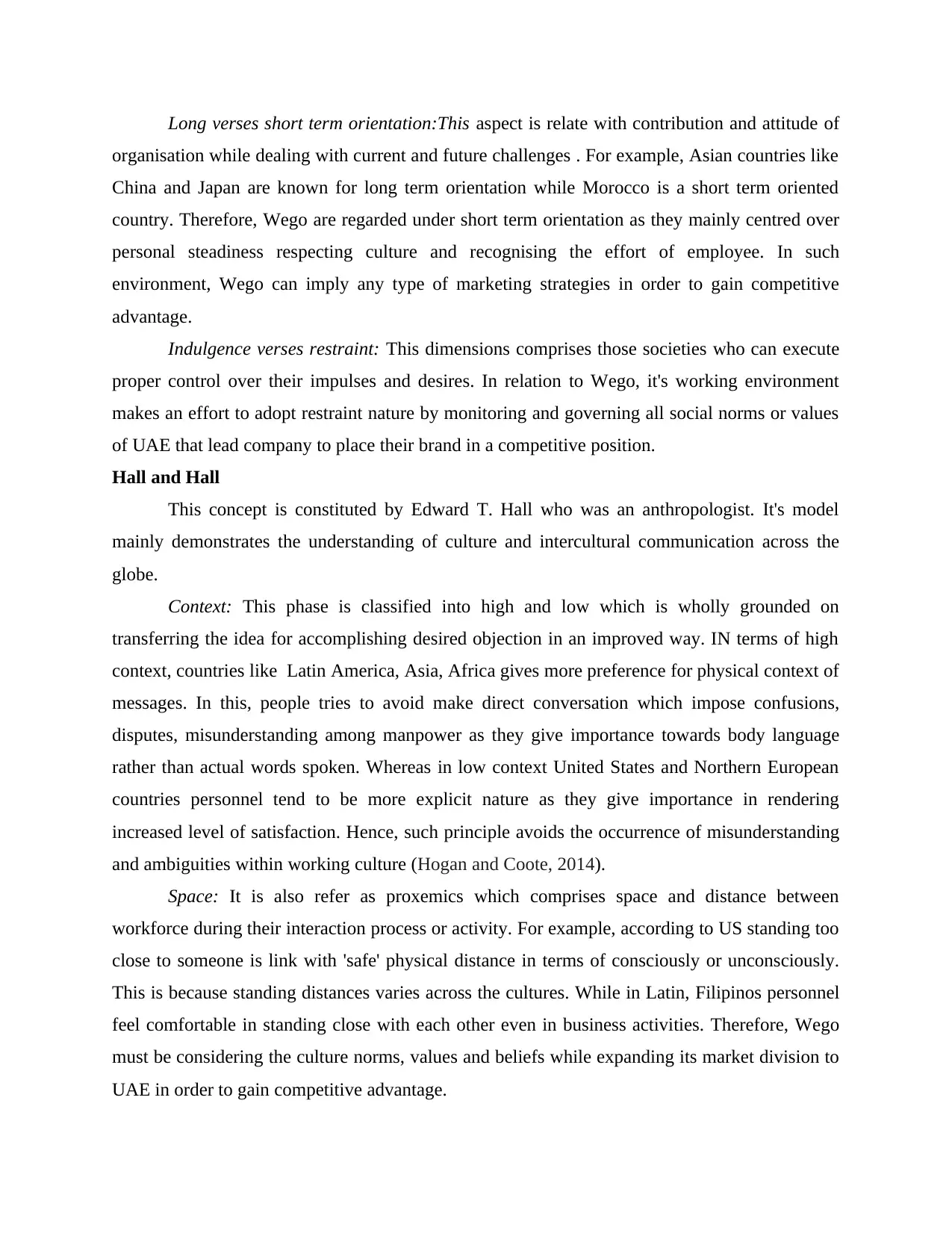
Long verses short term orientation:This aspect is relate with contribution and attitude of
organisation while dealing with current and future challenges . For example, Asian countries like
China and Japan are known for long term orientation while Morocco is a short term oriented
country. Therefore, Wego are regarded under short term orientation as they mainly centred over
personal steadiness respecting culture and recognising the effort of employee. In such
environment, Wego can imply any type of marketing strategies in order to gain competitive
advantage.
Indulgence verses restraint: This dimensions comprises those societies who can execute
proper control over their impulses and desires. In relation to Wego, it's working environment
makes an effort to adopt restraint nature by monitoring and governing all social norms or values
of UAE that lead company to place their brand in a competitive position.
Hall and Hall
This concept is constituted by Edward T. Hall who was an anthropologist. It's model
mainly demonstrates the understanding of culture and intercultural communication across the
globe.
Context: This phase is classified into high and low which is wholly grounded on
transferring the idea for accomplishing desired objection in an improved way. IN terms of high
context, countries like Latin America, Asia, Africa gives more preference for physical context of
messages. In this, people tries to avoid make direct conversation which impose confusions,
disputes, misunderstanding among manpower as they give importance towards body language
rather than actual words spoken. Whereas in low context United States and Northern European
countries personnel tend to be more explicit nature as they give importance in rendering
increased level of satisfaction. Hence, such principle avoids the occurrence of misunderstanding
and ambiguities within working culture (Hogan and Coote, 2014).
Space: It is also refer as proxemics which comprises space and distance between
workforce during their interaction process or activity. For example, according to US standing too
close to someone is link with 'safe' physical distance in terms of consciously or unconsciously.
This is because standing distances varies across the cultures. While in Latin, Filipinos personnel
feel comfortable in standing close with each other even in business activities. Therefore, Wego
must be considering the culture norms, values and beliefs while expanding its market division to
UAE in order to gain competitive advantage.
organisation while dealing with current and future challenges . For example, Asian countries like
China and Japan are known for long term orientation while Morocco is a short term oriented
country. Therefore, Wego are regarded under short term orientation as they mainly centred over
personal steadiness respecting culture and recognising the effort of employee. In such
environment, Wego can imply any type of marketing strategies in order to gain competitive
advantage.
Indulgence verses restraint: This dimensions comprises those societies who can execute
proper control over their impulses and desires. In relation to Wego, it's working environment
makes an effort to adopt restraint nature by monitoring and governing all social norms or values
of UAE that lead company to place their brand in a competitive position.
Hall and Hall
This concept is constituted by Edward T. Hall who was an anthropologist. It's model
mainly demonstrates the understanding of culture and intercultural communication across the
globe.
Context: This phase is classified into high and low which is wholly grounded on
transferring the idea for accomplishing desired objection in an improved way. IN terms of high
context, countries like Latin America, Asia, Africa gives more preference for physical context of
messages. In this, people tries to avoid make direct conversation which impose confusions,
disputes, misunderstanding among manpower as they give importance towards body language
rather than actual words spoken. Whereas in low context United States and Northern European
countries personnel tend to be more explicit nature as they give importance in rendering
increased level of satisfaction. Hence, such principle avoids the occurrence of misunderstanding
and ambiguities within working culture (Hogan and Coote, 2014).
Space: It is also refer as proxemics which comprises space and distance between
workforce during their interaction process or activity. For example, according to US standing too
close to someone is link with 'safe' physical distance in terms of consciously or unconsciously.
This is because standing distances varies across the cultures. While in Latin, Filipinos personnel
feel comfortable in standing close with each other even in business activities. Therefore, Wego
must be considering the culture norms, values and beliefs while expanding its market division to
UAE in order to gain competitive advantage.
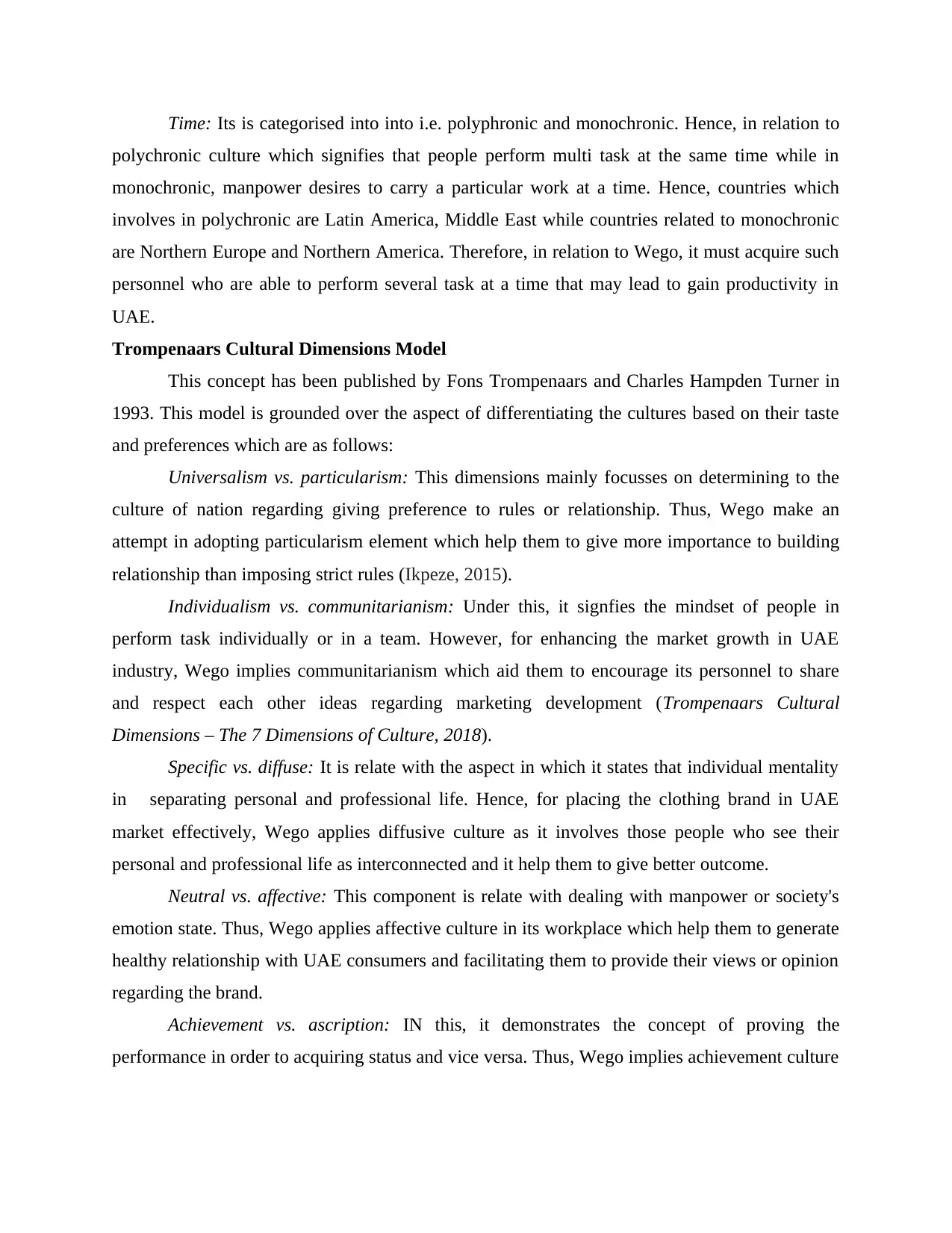
Time: Its is categorised into into i.e. polyphronic and monochronic. Hence, in relation to
polychronic culture which signifies that people perform multi task at the same time while in
monochronic, manpower desires to carry a particular work at a time. Hence, countries which
involves in polychronic are Latin America, Middle East while countries related to monochronic
are Northern Europe and Northern America. Therefore, in relation to Wego, it must acquire such
personnel who are able to perform several task at a time that may lead to gain productivity in
UAE.
Trompenaars Cultural Dimensions Model
This concept has been published by Fons Trompenaars and Charles Hampden Turner in
1993. This model is grounded over the aspect of differentiating the cultures based on their taste
and preferences which are as follows:
Universalism vs. particularism: This dimensions mainly focusses on determining to the
culture of nation regarding giving preference to rules or relationship. Thus, Wego make an
attempt in adopting particularism element which help them to give more importance to building
relationship than imposing strict rules (Ikpeze, 2015).
Individualism vs. communitarianism: Under this, it signfies the mindset of people in
perform task individually or in a team. However, for enhancing the market growth in UAE
industry, Wego implies communitarianism which aid them to encourage its personnel to share
and respect each other ideas regarding marketing development (Trompenaars Cultural
Dimensions – The 7 Dimensions of Culture, 2018).
Specific vs. diffuse: It is relate with the aspect in which it states that individual mentality
in separating personal and professional life. Hence, for placing the clothing brand in UAE
market effectively, Wego applies diffusive culture as it involves those people who see their
personal and professional life as interconnected and it help them to give better outcome.
Neutral vs. affective: This component is relate with dealing with manpower or society's
emotion state. Thus, Wego applies affective culture in its workplace which help them to generate
healthy relationship with UAE consumers and facilitating them to provide their views or opinion
regarding the brand.
Achievement vs. ascription: IN this, it demonstrates the concept of proving the
performance in order to acquiring status and vice versa. Thus, Wego implies achievement culture
polychronic culture which signifies that people perform multi task at the same time while in
monochronic, manpower desires to carry a particular work at a time. Hence, countries which
involves in polychronic are Latin America, Middle East while countries related to monochronic
are Northern Europe and Northern America. Therefore, in relation to Wego, it must acquire such
personnel who are able to perform several task at a time that may lead to gain productivity in
UAE.
Trompenaars Cultural Dimensions Model
This concept has been published by Fons Trompenaars and Charles Hampden Turner in
1993. This model is grounded over the aspect of differentiating the cultures based on their taste
and preferences which are as follows:
Universalism vs. particularism: This dimensions mainly focusses on determining to the
culture of nation regarding giving preference to rules or relationship. Thus, Wego make an
attempt in adopting particularism element which help them to give more importance to building
relationship than imposing strict rules (Ikpeze, 2015).
Individualism vs. communitarianism: Under this, it signfies the mindset of people in
perform task individually or in a team. However, for enhancing the market growth in UAE
industry, Wego implies communitarianism which aid them to encourage its personnel to share
and respect each other ideas regarding marketing development (Trompenaars Cultural
Dimensions – The 7 Dimensions of Culture, 2018).
Specific vs. diffuse: It is relate with the aspect in which it states that individual mentality
in separating personal and professional life. Hence, for placing the clothing brand in UAE
market effectively, Wego applies diffusive culture as it involves those people who see their
personal and professional life as interconnected and it help them to give better outcome.
Neutral vs. affective: This component is relate with dealing with manpower or society's
emotion state. Thus, Wego applies affective culture in its workplace which help them to generate
healthy relationship with UAE consumers and facilitating them to provide their views or opinion
regarding the brand.
Achievement vs. ascription: IN this, it demonstrates the concept of proving the
performance in order to acquiring status and vice versa. Thus, Wego implies achievement culture
⊘ This is a preview!⊘
Do you want full access?
Subscribe today to unlock all pages.

Trusted by 1+ million students worldwide
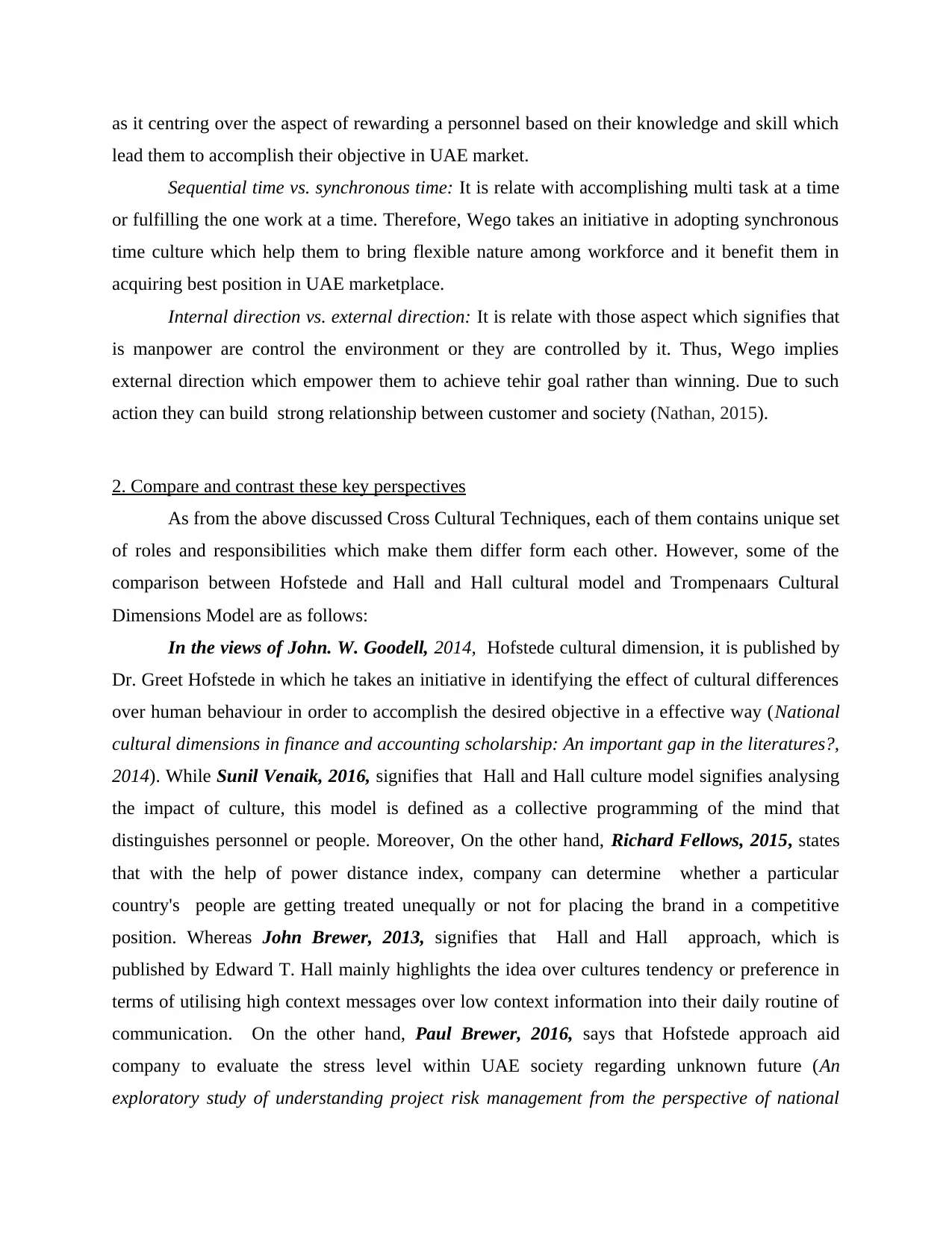
as it centring over the aspect of rewarding a personnel based on their knowledge and skill which
lead them to accomplish their objective in UAE market.
Sequential time vs. synchronous time: It is relate with accomplishing multi task at a time
or fulfilling the one work at a time. Therefore, Wego takes an initiative in adopting synchronous
time culture which help them to bring flexible nature among workforce and it benefit them in
acquiring best position in UAE marketplace.
Internal direction vs. external direction: It is relate with those aspect which signifies that
is manpower are control the environment or they are controlled by it. Thus, Wego implies
external direction which empower them to achieve tehir goal rather than winning. Due to such
action they can build strong relationship between customer and society (Nathan, 2015).
2. Compare and contrast these key perspectives
As from the above discussed Cross Cultural Techniques, each of them contains unique set
of roles and responsibilities which make them differ form each other. However, some of the
comparison between Hofstede and Hall and Hall cultural model and Trompenaars Cultural
Dimensions Model are as follows:
In the views of John. W. Goodell, 2014, Hofstede cultural dimension, it is published by
Dr. Greet Hofstede in which he takes an initiative in identifying the effect of cultural differences
over human behaviour in order to accomplish the desired objective in a effective way (National
cultural dimensions in finance and accounting scholarship: An important gap in the literatures?,
2014). While Sunil Venaik, 2016, signifies that Hall and Hall culture model signifies analysing
the impact of culture, this model is defined as a collective programming of the mind that
distinguishes personnel or people. Moreover, On the other hand, Richard Fellows, 2015, states
that with the help of power distance index, company can determine whether a particular
country's people are getting treated unequally or not for placing the brand in a competitive
position. Whereas John Brewer, 2013, signifies that Hall and Hall approach, which is
published by Edward T. Hall mainly highlights the idea over cultures tendency or preference in
terms of utilising high context messages over low context information into their daily routine of
communication. On the other hand, Paul Brewer, 2016, says that Hofstede approach aid
company to evaluate the stress level within UAE society regarding unknown future (An
exploratory study of understanding project risk management from the perspective of national
lead them to accomplish their objective in UAE market.
Sequential time vs. synchronous time: It is relate with accomplishing multi task at a time
or fulfilling the one work at a time. Therefore, Wego takes an initiative in adopting synchronous
time culture which help them to bring flexible nature among workforce and it benefit them in
acquiring best position in UAE marketplace.
Internal direction vs. external direction: It is relate with those aspect which signifies that
is manpower are control the environment or they are controlled by it. Thus, Wego implies
external direction which empower them to achieve tehir goal rather than winning. Due to such
action they can build strong relationship between customer and society (Nathan, 2015).
2. Compare and contrast these key perspectives
As from the above discussed Cross Cultural Techniques, each of them contains unique set
of roles and responsibilities which make them differ form each other. However, some of the
comparison between Hofstede and Hall and Hall cultural model and Trompenaars Cultural
Dimensions Model are as follows:
In the views of John. W. Goodell, 2014, Hofstede cultural dimension, it is published by
Dr. Greet Hofstede in which he takes an initiative in identifying the effect of cultural differences
over human behaviour in order to accomplish the desired objective in a effective way (National
cultural dimensions in finance and accounting scholarship: An important gap in the literatures?,
2014). While Sunil Venaik, 2016, signifies that Hall and Hall culture model signifies analysing
the impact of culture, this model is defined as a collective programming of the mind that
distinguishes personnel or people. Moreover, On the other hand, Richard Fellows, 2015, states
that with the help of power distance index, company can determine whether a particular
country's people are getting treated unequally or not for placing the brand in a competitive
position. Whereas John Brewer, 2013, signifies that Hall and Hall approach, which is
published by Edward T. Hall mainly highlights the idea over cultures tendency or preference in
terms of utilising high context messages over low context information into their daily routine of
communication. On the other hand, Paul Brewer, 2016, says that Hofstede approach aid
company to evaluate the stress level within UAE society regarding unknown future (An
exploratory study of understanding project risk management from the perspective of national
Paraphrase This Document
Need a fresh take? Get an instant paraphrase of this document with our AI Paraphraser
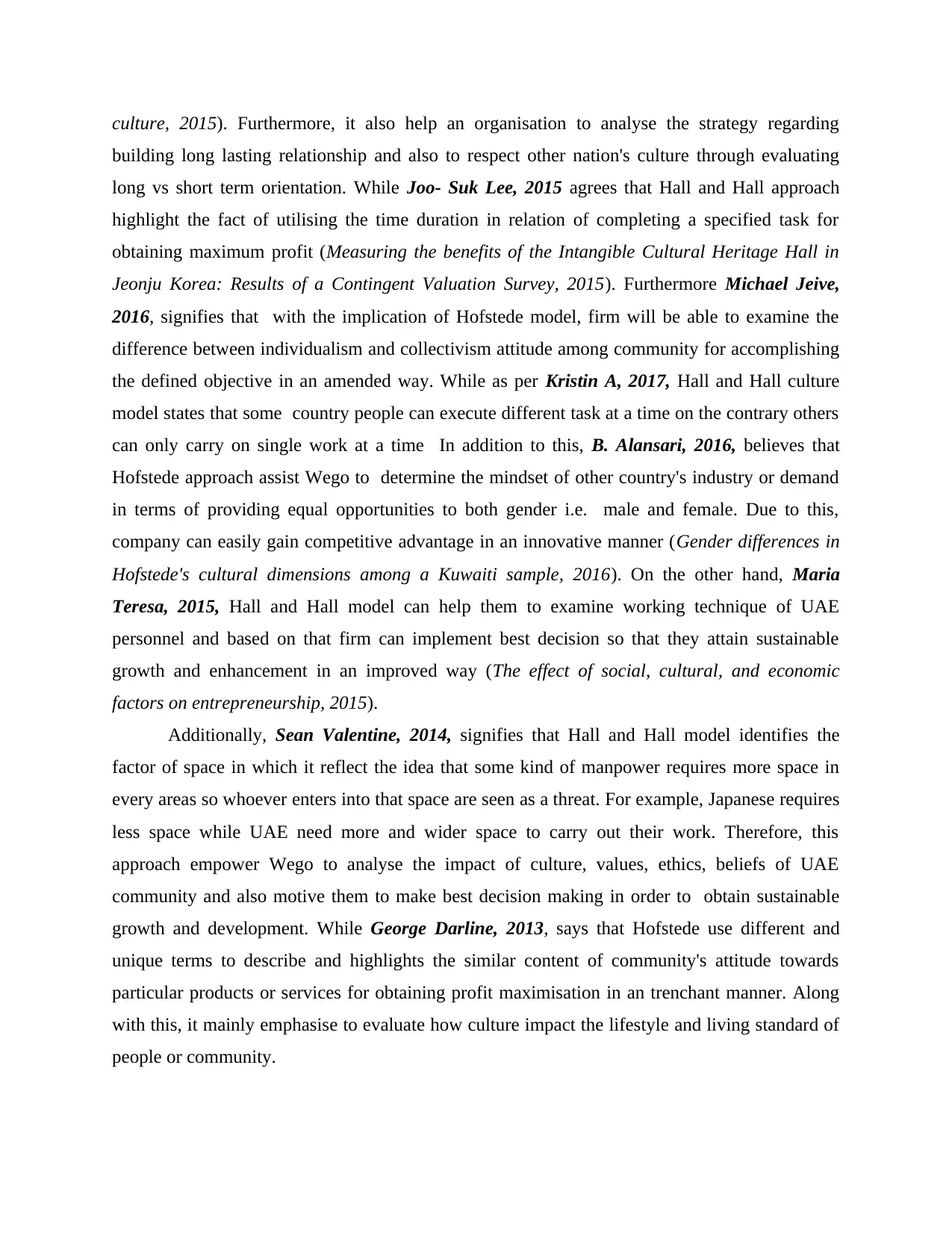
culture, 2015). Furthermore, it also help an organisation to analyse the strategy regarding
building long lasting relationship and also to respect other nation's culture through evaluating
long vs short term orientation. While Joo- Suk Lee, 2015 agrees that Hall and Hall approach
highlight the fact of utilising the time duration in relation of completing a specified task for
obtaining maximum profit (Measuring the benefits of the Intangible Cultural Heritage Hall in
Jeonju Korea: Results of a Contingent Valuation Survey, 2015). Furthermore Michael Jeive,
2016, signifies that with the implication of Hofstede model, firm will be able to examine the
difference between individualism and collectivism attitude among community for accomplishing
the defined objective in an amended way. While as per Kristin A, 2017, Hall and Hall culture
model states that some country people can execute different task at a time on the contrary others
can only carry on single work at a time In addition to this, B. Alansari, 2016, believes that
Hofstede approach assist Wego to determine the mindset of other country's industry or demand
in terms of providing equal opportunities to both gender i.e. male and female. Due to this,
company can easily gain competitive advantage in an innovative manner (Gender differences in
Hofstede's cultural dimensions among a Kuwaiti sample, 2016). On the other hand, Maria
Teresa, 2015, Hall and Hall model can help them to examine working technique of UAE
personnel and based on that firm can implement best decision so that they attain sustainable
growth and enhancement in an improved way (The effect of social, cultural, and economic
factors on entrepreneurship, 2015).
Additionally, Sean Valentine, 2014, signifies that Hall and Hall model identifies the
factor of space in which it reflect the idea that some kind of manpower requires more space in
every areas so whoever enters into that space are seen as a threat. For example, Japanese requires
less space while UAE need more and wider space to carry out their work. Therefore, this
approach empower Wego to analyse the impact of culture, values, ethics, beliefs of UAE
community and also motive them to make best decision making in order to obtain sustainable
growth and development. While George Darline, 2013, says that Hofstede use different and
unique terms to describe and highlights the similar content of community's attitude towards
particular products or services for obtaining profit maximisation in an trenchant manner. Along
with this, it mainly emphasise to evaluate how culture impact the lifestyle and living standard of
people or community.
building long lasting relationship and also to respect other nation's culture through evaluating
long vs short term orientation. While Joo- Suk Lee, 2015 agrees that Hall and Hall approach
highlight the fact of utilising the time duration in relation of completing a specified task for
obtaining maximum profit (Measuring the benefits of the Intangible Cultural Heritage Hall in
Jeonju Korea: Results of a Contingent Valuation Survey, 2015). Furthermore Michael Jeive,
2016, signifies that with the implication of Hofstede model, firm will be able to examine the
difference between individualism and collectivism attitude among community for accomplishing
the defined objective in an amended way. While as per Kristin A, 2017, Hall and Hall culture
model states that some country people can execute different task at a time on the contrary others
can only carry on single work at a time In addition to this, B. Alansari, 2016, believes that
Hofstede approach assist Wego to determine the mindset of other country's industry or demand
in terms of providing equal opportunities to both gender i.e. male and female. Due to this,
company can easily gain competitive advantage in an innovative manner (Gender differences in
Hofstede's cultural dimensions among a Kuwaiti sample, 2016). On the other hand, Maria
Teresa, 2015, Hall and Hall model can help them to examine working technique of UAE
personnel and based on that firm can implement best decision so that they attain sustainable
growth and enhancement in an improved way (The effect of social, cultural, and economic
factors on entrepreneurship, 2015).
Additionally, Sean Valentine, 2014, signifies that Hall and Hall model identifies the
factor of space in which it reflect the idea that some kind of manpower requires more space in
every areas so whoever enters into that space are seen as a threat. For example, Japanese requires
less space while UAE need more and wider space to carry out their work. Therefore, this
approach empower Wego to analyse the impact of culture, values, ethics, beliefs of UAE
community and also motive them to make best decision making in order to obtain sustainable
growth and development. While George Darline, 2013, says that Hofstede use different and
unique terms to describe and highlights the similar content of community's attitude towards
particular products or services for obtaining profit maximisation in an trenchant manner. Along
with this, it mainly emphasise to evaluate how culture impact the lifestyle and living standard of
people or community.
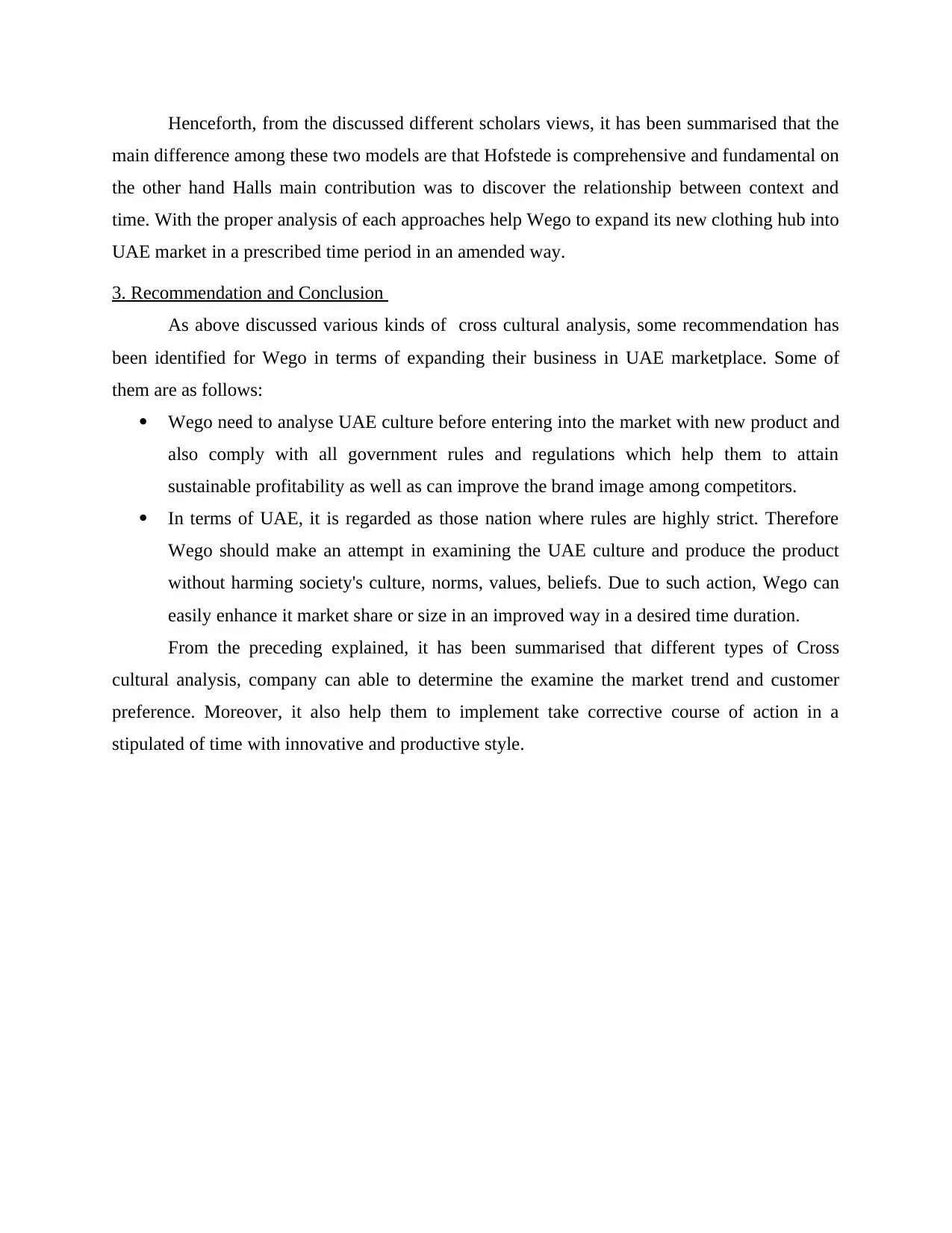
Henceforth, from the discussed different scholars views, it has been summarised that the
main difference among these two models are that Hofstede is comprehensive and fundamental on
the other hand Halls main contribution was to discover the relationship between context and
time. With the proper analysis of each approaches help Wego to expand its new clothing hub into
UAE market in a prescribed time period in an amended way.
3. Recommendation and Conclusion
As above discussed various kinds of cross cultural analysis, some recommendation has
been identified for Wego in terms of expanding their business in UAE marketplace. Some of
them are as follows:
Wego need to analyse UAE culture before entering into the market with new product and
also comply with all government rules and regulations which help them to attain
sustainable profitability as well as can improve the brand image among competitors.
In terms of UAE, it is regarded as those nation where rules are highly strict. Therefore
Wego should make an attempt in examining the UAE culture and produce the product
without harming society's culture, norms, values, beliefs. Due to such action, Wego can
easily enhance it market share or size in an improved way in a desired time duration.
From the preceding explained, it has been summarised that different types of Cross
cultural analysis, company can able to determine the examine the market trend and customer
preference. Moreover, it also help them to implement take corrective course of action in a
stipulated of time with innovative and productive style.
main difference among these two models are that Hofstede is comprehensive and fundamental on
the other hand Halls main contribution was to discover the relationship between context and
time. With the proper analysis of each approaches help Wego to expand its new clothing hub into
UAE market in a prescribed time period in an amended way.
3. Recommendation and Conclusion
As above discussed various kinds of cross cultural analysis, some recommendation has
been identified for Wego in terms of expanding their business in UAE marketplace. Some of
them are as follows:
Wego need to analyse UAE culture before entering into the market with new product and
also comply with all government rules and regulations which help them to attain
sustainable profitability as well as can improve the brand image among competitors.
In terms of UAE, it is regarded as those nation where rules are highly strict. Therefore
Wego should make an attempt in examining the UAE culture and produce the product
without harming society's culture, norms, values, beliefs. Due to such action, Wego can
easily enhance it market share or size in an improved way in a desired time duration.
From the preceding explained, it has been summarised that different types of Cross
cultural analysis, company can able to determine the examine the market trend and customer
preference. Moreover, it also help them to implement take corrective course of action in a
stipulated of time with innovative and productive style.
⊘ This is a preview!⊘
Do you want full access?
Subscribe today to unlock all pages.

Trusted by 1+ million students worldwide
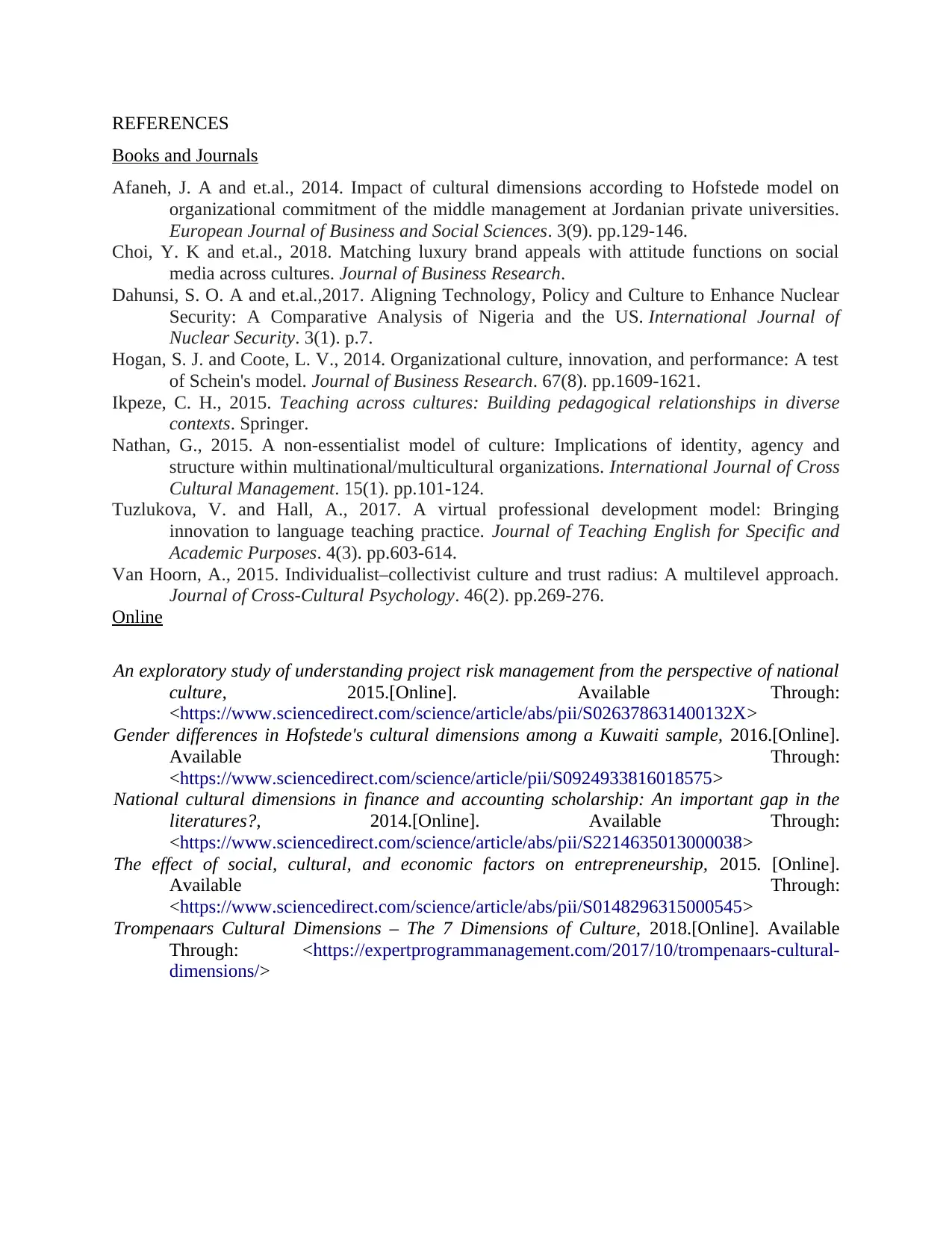
REFERENCES
Books and Journals
Afaneh, J. A and et.al., 2014. Impact of cultural dimensions according to Hofstede model on
organizational commitment of the middle management at Jordanian private universities.
European Journal of Business and Social Sciences. 3(9). pp.129-146.
Choi, Y. K and et.al., 2018. Matching luxury brand appeals with attitude functions on social
media across cultures. Journal of Business Research.
Dahunsi, S. O. A and et.al.,2017. Aligning Technology, Policy and Culture to Enhance Nuclear
Security: A Comparative Analysis of Nigeria and the US. International Journal of
Nuclear Security. 3(1). p.7.
Hogan, S. J. and Coote, L. V., 2014. Organizational culture, innovation, and performance: A test
of Schein's model. Journal of Business Research. 67(8). pp.1609-1621.
Ikpeze, C. H., 2015. Teaching across cultures: Building pedagogical relationships in diverse
contexts. Springer.
Nathan, G., 2015. A non-essentialist model of culture: Implications of identity, agency and
structure within multinational/multicultural organizations. International Journal of Cross
Cultural Management. 15(1). pp.101-124.
Tuzlukova, V. and Hall, A., 2017. A virtual professional development model: Bringing
innovation to language teaching practice. Journal of Teaching English for Specific and
Academic Purposes. 4(3). pp.603-614.
Van Hoorn, A., 2015. Individualist–collectivist culture and trust radius: A multilevel approach.
Journal of Cross-Cultural Psychology. 46(2). pp.269-276.
Online
An exploratory study of understanding project risk management from the perspective of national
culture, 2015.[Online]. Available Through:
<https://www.sciencedirect.com/science/article/abs/pii/S026378631400132X>
Gender differences in Hofstede's cultural dimensions among a Kuwaiti sample, 2016.[Online].
Available Through:
<https://www.sciencedirect.com/science/article/pii/S0924933816018575>
National cultural dimensions in finance and accounting scholarship: An important gap in the
literatures?, 2014.[Online]. Available Through:
<https://www.sciencedirect.com/science/article/abs/pii/S2214635013000038>
The effect of social, cultural, and economic factors on entrepreneurship, 2015. [Online].
Available Through:
<https://www.sciencedirect.com/science/article/abs/pii/S0148296315000545>
Trompenaars Cultural Dimensions – The 7 Dimensions of Culture, 2018.[Online]. Available
Through: <https://expertprogrammanagement.com/2017/10/trompenaars-cultural-
dimensions/>
Books and Journals
Afaneh, J. A and et.al., 2014. Impact of cultural dimensions according to Hofstede model on
organizational commitment of the middle management at Jordanian private universities.
European Journal of Business and Social Sciences. 3(9). pp.129-146.
Choi, Y. K and et.al., 2018. Matching luxury brand appeals with attitude functions on social
media across cultures. Journal of Business Research.
Dahunsi, S. O. A and et.al.,2017. Aligning Technology, Policy and Culture to Enhance Nuclear
Security: A Comparative Analysis of Nigeria and the US. International Journal of
Nuclear Security. 3(1). p.7.
Hogan, S. J. and Coote, L. V., 2014. Organizational culture, innovation, and performance: A test
of Schein's model. Journal of Business Research. 67(8). pp.1609-1621.
Ikpeze, C. H., 2015. Teaching across cultures: Building pedagogical relationships in diverse
contexts. Springer.
Nathan, G., 2015. A non-essentialist model of culture: Implications of identity, agency and
structure within multinational/multicultural organizations. International Journal of Cross
Cultural Management. 15(1). pp.101-124.
Tuzlukova, V. and Hall, A., 2017. A virtual professional development model: Bringing
innovation to language teaching practice. Journal of Teaching English for Specific and
Academic Purposes. 4(3). pp.603-614.
Van Hoorn, A., 2015. Individualist–collectivist culture and trust radius: A multilevel approach.
Journal of Cross-Cultural Psychology. 46(2). pp.269-276.
Online
An exploratory study of understanding project risk management from the perspective of national
culture, 2015.[Online]. Available Through:
<https://www.sciencedirect.com/science/article/abs/pii/S026378631400132X>
Gender differences in Hofstede's cultural dimensions among a Kuwaiti sample, 2016.[Online].
Available Through:
<https://www.sciencedirect.com/science/article/pii/S0924933816018575>
National cultural dimensions in finance and accounting scholarship: An important gap in the
literatures?, 2014.[Online]. Available Through:
<https://www.sciencedirect.com/science/article/abs/pii/S2214635013000038>
The effect of social, cultural, and economic factors on entrepreneurship, 2015. [Online].
Available Through:
<https://www.sciencedirect.com/science/article/abs/pii/S0148296315000545>
Trompenaars Cultural Dimensions – The 7 Dimensions of Culture, 2018.[Online]. Available
Through: <https://expertprogrammanagement.com/2017/10/trompenaars-cultural-
dimensions/>
Paraphrase This Document
Need a fresh take? Get an instant paraphrase of this document with our AI Paraphraser
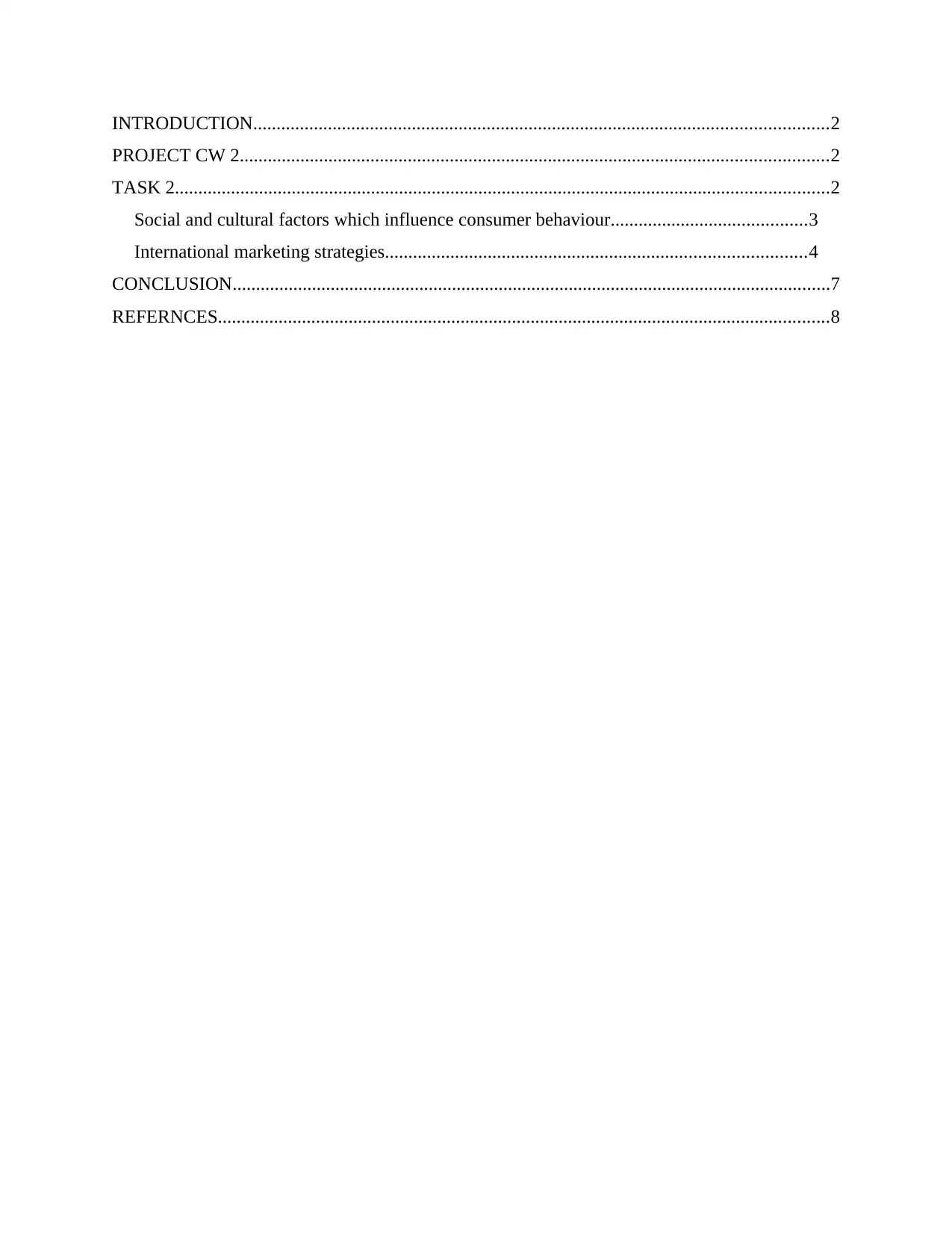
INTRODUCTION...........................................................................................................................2
PROJECT CW 2..............................................................................................................................2
TASK 2............................................................................................................................................2
Social and cultural factors which influence consumer behaviour..........................................3
International marketing strategies..........................................................................................4
CONCLUSION................................................................................................................................7
REFERNCES...................................................................................................................................8
PROJECT CW 2..............................................................................................................................2
TASK 2............................................................................................................................................2
Social and cultural factors which influence consumer behaviour..........................................3
International marketing strategies..........................................................................................4
CONCLUSION................................................................................................................................7
REFERNCES...................................................................................................................................8
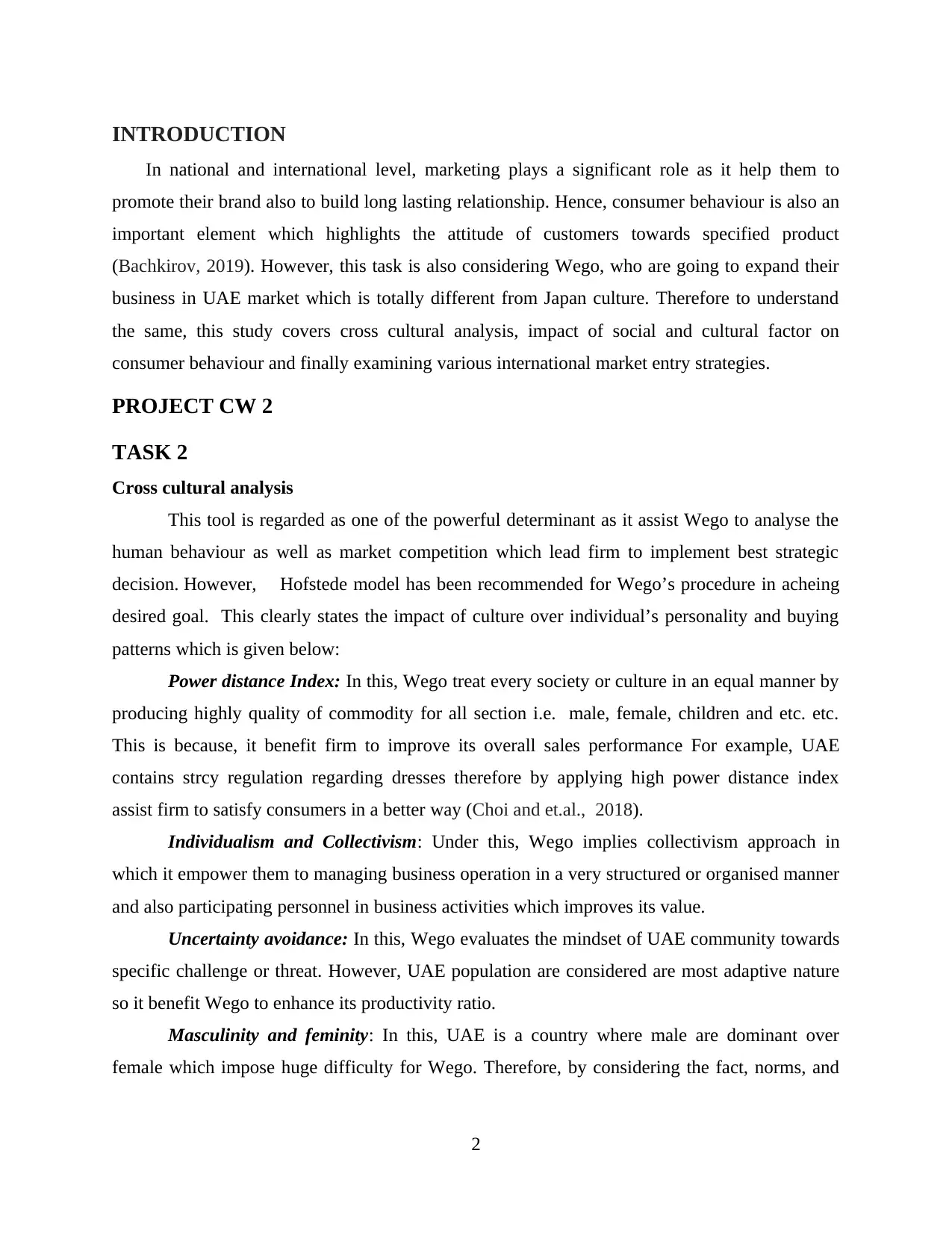
INTRODUCTION
In national and international level, marketing plays a significant role as it help them to
promote their brand also to build long lasting relationship. Hence, consumer behaviour is also an
important element which highlights the attitude of customers towards specified product
(Bachkirov, 2019). However, this task is also considering Wego, who are going to expand their
business in UAE market which is totally different from Japan culture. Therefore to understand
the same, this study covers cross cultural analysis, impact of social and cultural factor on
consumer behaviour and finally examining various international market entry strategies.
PROJECT CW 2
TASK 2
Cross cultural analysis
This tool is regarded as one of the powerful determinant as it assist Wego to analyse the
human behaviour as well as market competition which lead firm to implement best strategic
decision. However, Hofstede model has been recommended for Wego’s procedure in acheing
desired goal. This clearly states the impact of culture over individual’s personality and buying
patterns which is given below:
Power distance Index: In this, Wego treat every society or culture in an equal manner by
producing highly quality of commodity for all section i.e. male, female, children and etc. etc.
This is because, it benefit firm to improve its overall sales performance For example, UAE
contains strcy regulation regarding dresses therefore by applying high power distance index
assist firm to satisfy consumers in a better way (Choi and et.al., 2018).
Individualism and Collectivism: Under this, Wego implies collectivism approach in
which it empower them to managing business operation in a very structured or organised manner
and also participating personnel in business activities which improves its value.
Uncertainty avoidance: In this, Wego evaluates the mindset of UAE community towards
specific challenge or threat. However, UAE population are considered are most adaptive nature
so it benefit Wego to enhance its productivity ratio.
Masculinity and feminity: In this, UAE is a country where male are dominant over
female which impose huge difficulty for Wego. Therefore, by considering the fact, norms, and
2
In national and international level, marketing plays a significant role as it help them to
promote their brand also to build long lasting relationship. Hence, consumer behaviour is also an
important element which highlights the attitude of customers towards specified product
(Bachkirov, 2019). However, this task is also considering Wego, who are going to expand their
business in UAE market which is totally different from Japan culture. Therefore to understand
the same, this study covers cross cultural analysis, impact of social and cultural factor on
consumer behaviour and finally examining various international market entry strategies.
PROJECT CW 2
TASK 2
Cross cultural analysis
This tool is regarded as one of the powerful determinant as it assist Wego to analyse the
human behaviour as well as market competition which lead firm to implement best strategic
decision. However, Hofstede model has been recommended for Wego’s procedure in acheing
desired goal. This clearly states the impact of culture over individual’s personality and buying
patterns which is given below:
Power distance Index: In this, Wego treat every society or culture in an equal manner by
producing highly quality of commodity for all section i.e. male, female, children and etc. etc.
This is because, it benefit firm to improve its overall sales performance For example, UAE
contains strcy regulation regarding dresses therefore by applying high power distance index
assist firm to satisfy consumers in a better way (Choi and et.al., 2018).
Individualism and Collectivism: Under this, Wego implies collectivism approach in
which it empower them to managing business operation in a very structured or organised manner
and also participating personnel in business activities which improves its value.
Uncertainty avoidance: In this, Wego evaluates the mindset of UAE community towards
specific challenge or threat. However, UAE population are considered are most adaptive nature
so it benefit Wego to enhance its productivity ratio.
Masculinity and feminity: In this, UAE is a country where male are dominant over
female which impose huge difficulty for Wego. Therefore, by considering the fact, norms, and
2
⊘ This is a preview!⊘
Do you want full access?
Subscribe today to unlock all pages.

Trusted by 1+ million students worldwide
1 out of 18
Related Documents
Your All-in-One AI-Powered Toolkit for Academic Success.
+13062052269
info@desklib.com
Available 24*7 on WhatsApp / Email
![[object Object]](/_next/static/media/star-bottom.7253800d.svg)
Unlock your academic potential
Copyright © 2020–2026 A2Z Services. All Rights Reserved. Developed and managed by ZUCOL.




